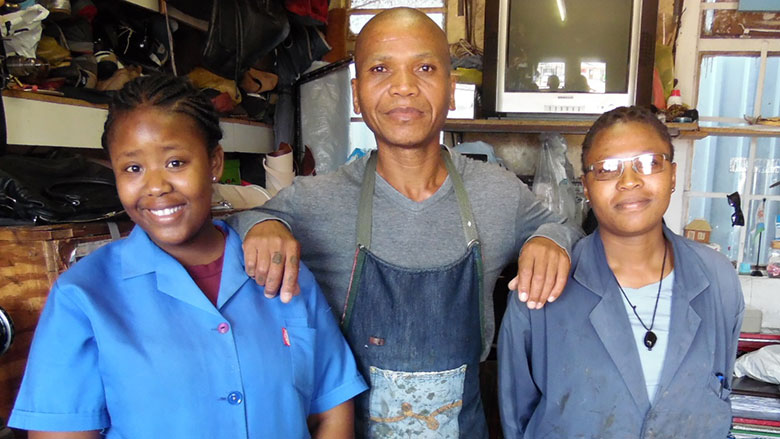MASERU, March 7, 2017—Fusi Khoali inherited his shoe repair business from his father in 2004. Since 1972, their main trade has been that of repairing shoes, leather bags, and belts. Now, after undertaking a skills development training with the assistance of the Lesotho Enterprise Assistance Program (LEAP), Khoali is able to produce high quality leather bags and shoes that he sells at local craft markets and supplies to retailers in South Africa and the United States.
The LEAP is supported through a broader World Bank-financed $13 million project, the Second Private Sector Competitiveness and Economic Diversification Project, which aims to increase private sector investment, enterprise growth, and job creation through the development of selected non-textile industries. Funded by International Development Association (IDA), the World Bank’s fund for the poorest countries, the project supports the government’s efforts to diversify the economy and decrease reliance on textile exports as the main engine of growth.
To date, 118 Basotho-owned micro, small, and medium enterprises (MSMEs) as well as cooperatives have benefited from the program. Assistance provided under the program includes grants for technical capacity building to improve market readiness, development of marketing tools such as websites and other branding and promotional material, and the development of business systems such as point of sales (POS) systems and accounting software.
“The assistance I received under the LEAP helped me attend a leather academy where I learned about product design, product assembly, quality finishing, and tool handling. I am now more confident in my craft and the quality of my work is evident in that even people coming from overseas place orders with us,” says Khoali.
“New growth areas such as horticulture, tourism, and tourism-linked sectors have tremendous potential to create sustainable jobs and improve livelihoods,” explains Ina Mogollon, World Bank Senior Private Sector Specialist and Task Team Leader on the project. “That is why under the LEAP, support is targeted on these sectors.”
Of the 118 businesses assisted through the LEAP, these include the locally budding Lesotho Potatoes Association which received assistance with branding and packaging of their product which they now supply to Pick n Pay, a South African supermarket chain store. Another is House of Thethana, a modern textile design business owned by two young Basotho women which focuses on the design, print, and conversion of Lesotho inspired fabric. The two female entrepreneurs were provided funding to exhibit their product at the Africa and Middle East Trade and Investment Summit which was held in Ifrane, Morocco in September 2016.
“The LEAP allows beneficiaries to choose the best business development services to build their competitiveness for domestic and export markets. They are assisted in refining their export and expansion plans and in implementing these plans,” noted Chaba Mokuku, project manager for LEAP.

